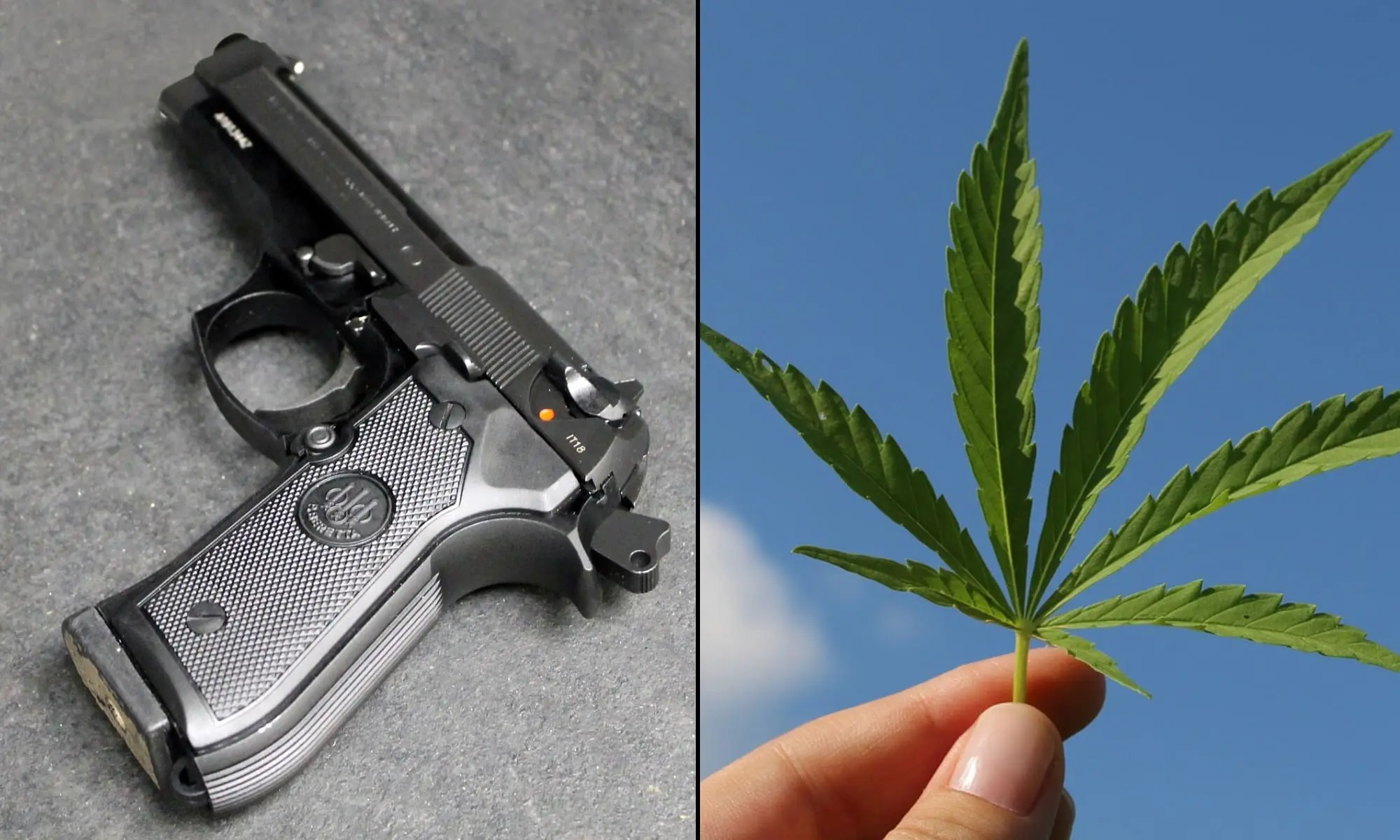Politics
GOP Senators Discuss Federal Ban On Marijuana Users Owning Guns As Supreme Court Considers Taking Up Issue

Several Republican senators are questioning the federal ban on gun possession by people who use marijuana—with one saying that if alcohol drinkers can lawfully buy and use firearms, the same standard should apply to cannabis consumers.
In a series of interviews with Marijuana Moment, the GOP lawmakers discussed the intersection of Second Amendment rights and drug policy as the U.S. Supreme Court is considering taking up several pending cases on the issue—which centers around a federal statute known as Section 922(g)(3) that some say is inconsistent with conservative principles.
“Why would I have a problem with that any more than somebody who drinks alcohol?” Sen. Thom Tillis (R-NC) said of cannabis consumers being able to possess guns.
Sen. Dan Sullivan (R-AK) said that while he needs to “look into the details” of the specific pending legal cases before the Supreme Court, he’s “highly skeptical” of the ban, “given that marijuana is legal in my state, and my state probably has the most gun owners of any state in the country.”
“A Second Amendment right can’t be trumped by a statute,” he said. “That’s why it’s called a constitutional right.”
On the flip side, however, Sen. Ron Johnson (R-WI) said that he broadly has a “problem with all this legalization of marijuana in general and using cars,” suggesting that he believes cannabis reform is associated with increased risk of traffic safety issues, despite conflicting evidence.
“Obviously you shouldn’t be using a firearm if you’re under the influence of anything,” Johnson told Marijuana Moment.
To be clear, the several cases the high court justices were scheduled to discuss at a closed-door meeting on Friday don’t concern whether people who are actively intoxicated on marijuana or other substances should handle firearms; they have to do with the law that bars anyone who is a user of cannabis from even owning or purchasing a gun.
Sen. Cynthia Lummis (R-WY) gave a more nuanced response to the question about the various cases pending before the Supreme Court on the issue, stating that if she was in the justices’ position and wanted to “duck the issue,” she’d take up one the Justice Department has prioritized that involves cocaine as well as marijuana.
“But I haven’t heard anything about it,” she said. “I think it will be revealing if they grant cert to one and not the other.”
Sullivan, for his part, said that for cannabis reformers, the case the Trump administration is asking the justices to take up involving cocaine “might not be the test case you want.”
Meanwhile, a man who was prosecuted after admitting to lying about his marijuana use on a federal firearms purchasing form recently asked the Supreme Court to take up the matter as the justices are actively considering several other cases on cannabis consumers’ gun rights.
The new petition to the high court comes as the Justice Department is separately asking it to dismiss one of multiple pending cases concerning marijuana and gun rights, in large part because it expects the justices to make a precedent-setting ruling on the issue.
In August, the Tenth Circuit ruled that the government must prove that people who use marijuana “pose a risk of future danger” if it wants to justify applying a law banning cannabis consumers from owning firearms.
The Justice Department appealed that ruling in 2023, sending it to the Tenth Circuit. That three-judge panel said in a recent filing that they “agree with much of the district court’s analysis” of the legal considerations, including its challenge to the federal government’s claims that there is historically analogous precedent substantiating the firearm ban for cannabis consumers.
Part of DOJ’s argument was that the ban is historically consistent with prohibitions on gun ownership by people with mental illness. The appeals court said “the government cannot justify” the current policy based on that standard.
The lower court largely based his initial decision on an interpretation of a Supreme Court ruling in which the justices generally created a higher standard for policies that seek to impose restrictions on gun rights.
The ruling states that any such restrictions must be consistent with the historical context of the Second Amendment’s original 1791 ratification.
The historical analogues that the Justice Department relied on to make the case that the ban is consistent included references to antiquated case law preventing Catholics, loyalists, slaves and Indians from having guns.
The circuit court, for its part, said that “the government must show non-intoxicated marijuana users pose a risk of future danger” to support the current policy. “This inquiry, which may involve fact finding, is best suited for the district court.”
This opinion comes nearly a year after the Tenth Circuit heard oral arguments in the case, with judges questioning not only the firearms prohibition itself but also whether it was within the scope of the appeals panel’s power to review the underlying lower court’s decision. Ultimately, they determined that they did possess that authority.
Meanwhile, in the U.S. Court of Appeals for the Eleventh District, judges recently ruled in favor of medical cannabis patients who want to exercise their Second Amendment rights to possess firearms.
As a recent report from the Congressional Research Service (CRS) explained the current legal landscape, a growing number of federal courts are now “finding constitutional problems in the application of at least some parts” of the firearms prohibition.
In a July ruling, for instance, a three-judge panel for the U.S. Court of Appeals for the Eighth Circuit vacated a defendant’s conviction and remanded the case back to a district court, noting that a retrial before a jury may be necessary to determine whether cannabis in fact caused the defendant to be dangerous or pose a credible threat to others.
By contrast, the Third Circuit last month said in a published opinion that district courts must make “individualized judgments” to determine whether 922(g)(3) is constitutional as applied to particular defendants.
The appeals panel ruled that while a person “need not have harmed someone, threatened harm, or otherwise acted dangerously to justify his disarmament,” the history of gun laws in the country requires that “district courts must make individualized judgments and conclude that disarming a drug user is needed to address a risk that he would pose a physical danger to others.”
Judges in that case noted that historical restrictions on gun ownership under “drunkenness and lunacy laws” in the U.S. “were still always based on an ‘individualized assessment’ rather than a categorical judgment.”
Earlier this year, a federal judge in Rhode Island ruled that the ban was unconstitutional as applied to two defendants, writing that the government failed to establish that the “sweeping” prohibition against gun ownership by marijuana users was grounded in historical precedent.
A federal judge in El Paso separately ruled late last year that the government’s ongoing ban on gun ownership by habitual marijuana users is unconstitutional in the case of a defendant who earlier pleaded guilty to the criminal charge. The court allowed the man to withdraw the plea and ordered that the indictment against him be dismissed.
—
Marijuana Moment is tracking hundreds of cannabis, psychedelics and drug policy bills in state legislatures and Congress this year. Patreon supporters pledging at least $25/month get access to our interactive maps, charts and hearing calendar so they don’t miss any developments.
![]()
Learn more about our marijuana bill tracker and become a supporter on Patreon to get access.
—
Meanwhile, at an NRA conference in 2023, Trump suggested there might be a link between the use of “genetically engineered” marijuana and mass shootings. He listed a number of controversial and unproven factors that he said at the time he would direct the Food and Drug Administration (FDA) to investigate as possibly causing the ongoing scourge of mass shooting afflicting the country.
“We have to look at whether common psychiatric drugs, as well as genetically engineered cannabis and other narcotics, are causing psychotic breaks” that lead to gun violence, he said.
Last year, then-President Joe Biden’s son Hunter was convicted by a federal jury of violating statute by buying and possessing a gun while an active user of crack cocaine. Two Republican congressmen challenged the basis of that conviction, with one pointing out that there are “millions of marijuana users” who own guns but should not be prosecuted.
The situation has caused confusion among medical marijuana patients, state lawmakers and advocacy groups, among others. The NRA’s lobbying arm said recently that the court rulings on the cannabis and guns issue have “led to a confusing regulatory landscape” that have impacted Americans’ 2nd Amendment rights.
Meanwhile, some states have passed their own laws either further restricting or attempting to preserve gun rights as they relate to marijuana. Recently a Pennsylvania lawmaker introduced a bill meant to remove state barriers to medical marijuana patients carrying firearms.
Colorado activists also attempted to qualify an initiative for November’s ballot that would have protected the Second Amendment rights of marijuana consumers in that state, but the campaign’s signature-gathering drive ultimately fell short.
As 2024 drew to a close, the ATF issued a warning to Kentucky residents that, if they choose to participate in the state’s medical marijuana program that’s set to launch imminently, they will be prohibited from buying or possessing firearms under federal law.
Since then, bipartisan state lawmakers have introduced legislation that would urge Kentucky’s representatives in Congress to amend federal law to clarify that users of medical marijuana may legally possess firearms, though no action has since been taken on that bill.
Kentucky Gov. Andy Beshear (D) said in January that he supported the legislature’s effort to urge the state’s congressional delegation to call for federal reforms to protect the 2nd Amendment rights of medical marijuana patients, but the governor added that he’d like to see even more sweeping change on the federal level.
The LCB contributed reporting from Washington, D.C.



